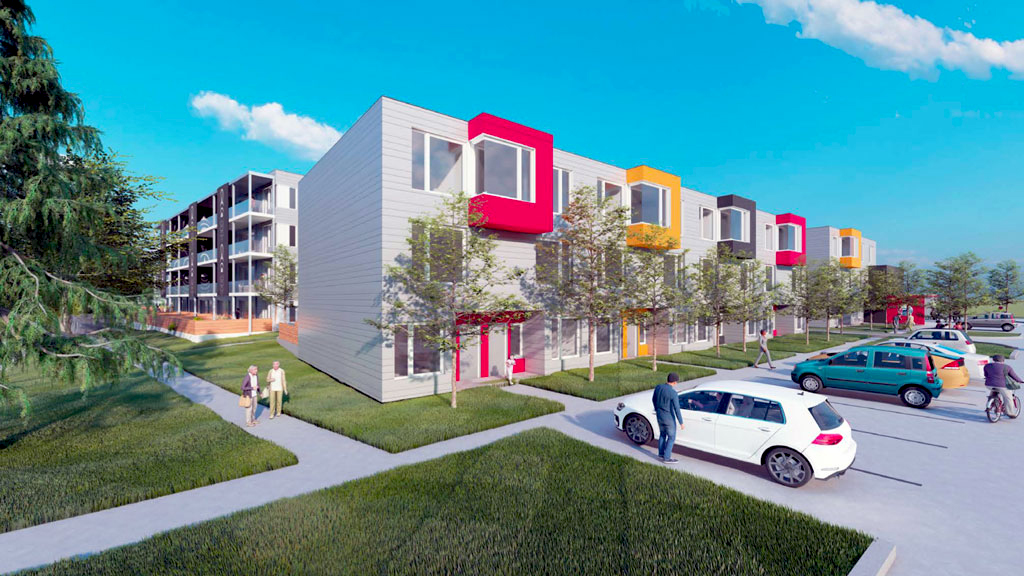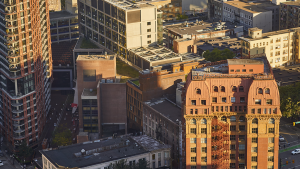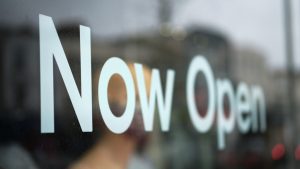The Squamish Nation is embarking on a new housing development effort to bring its members home and decolonize the built environment.
“The Squamish First Nation, like many others in this country and in the province of B.C. and in Vancouver especially, have been experiencing a housing crisis,” said Sarah Silva, CEO of the Hiyá̓m̓ Housing Society. “We are in an urban setting, the rents are really expensive and a lot of our members have been forced out of our community. They are away from family, friends and supports, so the nation said that housing is a priority to look at.”
In the past the nation built single family homes for members, but that program has a 1,000-person, 30-year waitlist. A new approach was needed.
The society, whose name means “coming home” in the Squamish language, was founded in 2019 by the Squamish Nation Council. The not-for-profit organization is responsible for building and managing affordable housing for the Squamish people.
Silva explained their goal is to not only enable members to come home by providing affordable housing, they want that housing to reflect the culture.
Last month, these efforts took a major step forward when a majority of Squamish members voted to move ahead with affordable housing projects on three parcels of land during a land designation referendum. Under the Indian Act, Indigenous Services Canada requires that Squamish members vote on whether to designate land for high-density affordable housing.
“We created a webpage, had information at different events in the community and we also tried to make it more fun, especially for the young people because this vote affected them the most,” said Silva, who added the day of the referendum was a celebration with bannock makers, drummers and singers.
The land designation allows the nation to pursue different funding and development options.
The first of the three projects has already secured funding through BC Housing and the Canada Mortgage and Housing Corporation. It is a 94-unit housing complex located on Mathias Road in North Vancouver, across the street from the Capilano Reserve Park and near the Lions Gate Bridge.
Residents will be independent elders, families and youth. Plans include a community garden and a co-operative grocery store owned by the community.
Construction is expected to start in September and be completed by the end of 2022. An agreement with Metro Vancouver is already in place to service the site.The nation is also looking at building a modular four-storey structure and a 280-unit project, but those are still being planned.
Silva says one of the top priorities as the nation and its partners look to develop is cultural support.
“Yes we are developing housing, but it is so much more than that,” said Silva. “We want to make sure that what people come home to reflects who they are and our traditional ways, considering we have been pushed out of our communities and we have had structures forced upon us.”
Silva explained in the context of truth and reconciliation efforts happening around the country, the goal is to create spaces that promote health and healing.
“Part of being healthy is having our culture in our communities,” she said. “We are coming home to heal and be schooled in our own language.”
She hopes when nation members grow up and leave their Squamish housing they will have experienced Squamish language and culture. The team is currently in discussions with members about what this means for the project designs. This includes carving areas, gardens to grow traditional medicine plants, areas to smoke salmon, and smoke and water bathing facilities.
“A lot of the time we were building and designing housing based on an approach given by different governments,” said Silva. “We want to decolonize that and have our own way of living together.”
Silva added the initial projects on the redesignated parcels is just the beginning and the society is looking to develop more sites with partners. They also are looking at various models of home ownership and renting to own.
“This is really just the first step,” she said.
Follow the author on Twitter @RussellReports.











Recent Comments
comments for this post are closed